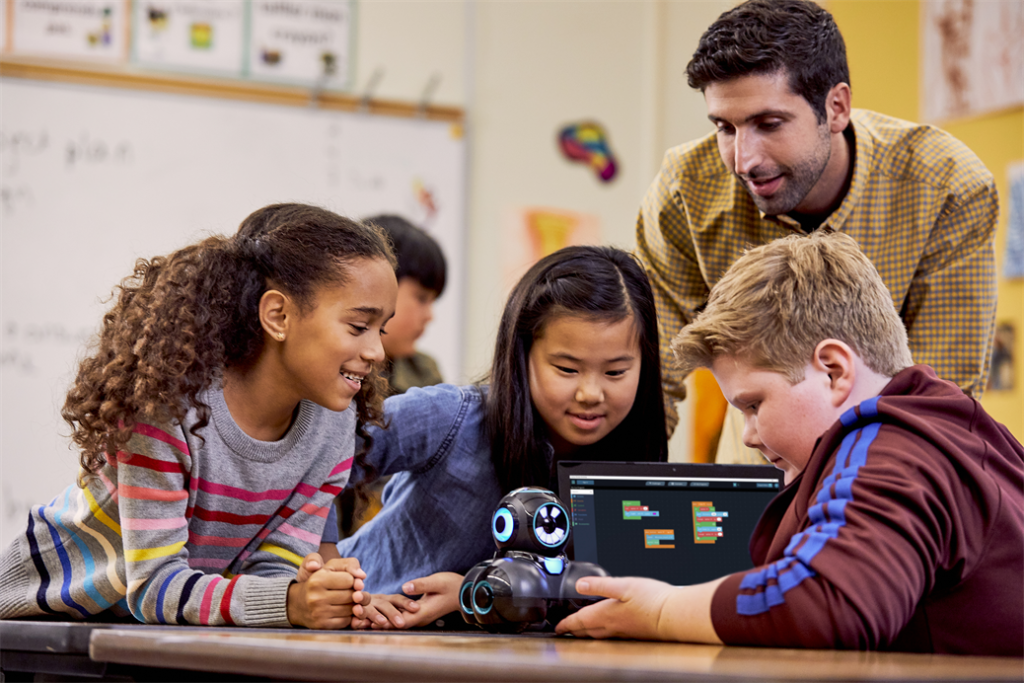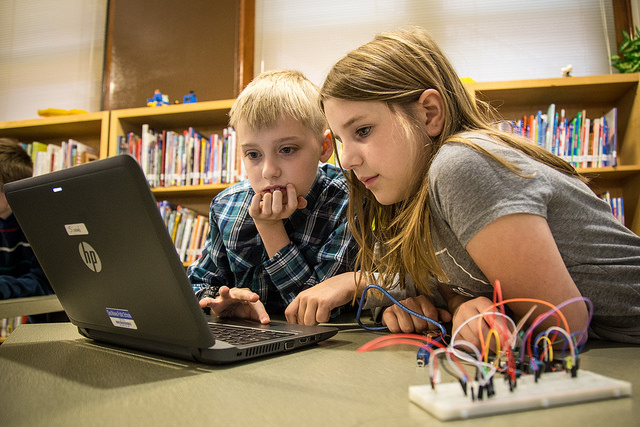There is a growing global demand for science, technology, engineering and math (STEM) professionals. At the same time, experts in science education are calling for students to become more “scientifically literate.” This call, however, is about more than filling jobs.

By Steven Korte
A basic understanding of scientific concepts, processes, and ways of thinking is critical for students to succeed in the world of today and tomorrow. According to the Organisation for Economic Co-operation and Development’s 2014 report on the results of the international PISA 2012 science assessment, “An understanding of science and technology is central to a young person’s preparedness for life in modern society.”
This means that students must go beyond memorizing science facts and theories; they must gain experience with the tools and practices of science. Technology can help. While technology alone does not create scientific understanding, it represents a key tool for promoting inquiry investigations.
A substantial body of research confirms the positive impact of inquiry-based instruction on students’ understanding of science, including substantially higher learning when compared to traditional instruction. Further, education experts specify that technology is most effective in supporting student learning in science when it is used in an inquiry context. Indeed, blending technology into data collection, analysis and visualization as part of inquiry-based instruction has been shown to deepen students’ understanding, and increase their motivation and interest in science.
Districts transitioning to or implementing STEM programs should consider the following points:
-
Lab investigations and technology tools should be connected with classroom experiences, including lectures, readings and discussions. Lab experiences and technology are much more effective when fully integrated into the curriculum and the flow of classroom science lessons.
-
Whether teachers choose to use a structured, guided or open inquiry format, lab activities should give students the opportunity to apply the scientific process to their learning. These activities should allow them to question and investigate; make predictions; collect, analyze and interpret data; refine their questions; and engage in argumentation from evidence. This builds problem-solving and higher-order thinking skills, as well as “soft skills” such as communication and collaboration.
-
Inquiry-based investigations inside and outside the classroom should engage students in real-life scientific and engineering practices. Students should also have the opportunity to use real-world tools to make data meaningful for them while they “do” science.
-
Traditional labs can be time-consuming and classroom sets of industry equipment can be prohibitively expensive. Be sure that lab investigations and technology tools are specifically designed for instructional use to save time and money, and reduce frustration. For example, traditional cell respiration labs are typically complex and inaccurate. In a respiration lab activity built to facilitate student understanding, the setup for a carbon dioxide or oxygen gas sensor should be simple, so accurate data can collected in minutes with minimal frustration.
-
To maximize your technology investment, make sure tools such as sensors and probes are compatible with any classroom environment and work on a variety of platforms, including iPads, Chromebooks, Android tablets, Mac and Windows computers, and netbooks. In addition, make certain the tools match the ability levels of your students.
-
A key part of the scientific process is the sharing, analysis and discussion of data. Consider how students’ data will be transmitted from tools, such as sensors, to their computer or tablet. Will it be done via a USB or wireless connection? Will the data be transmitted directly to the student’s device or will it go to the cloud first? Can students do this themselves or will they need teacher assistance? Allowing students to get their data faster gives them more time for analysis and discussion, which is key to building scientific understanding.
-
When possible, consider investing in multi-measure sensors that allow for the collection of multiple, simultaneous measurements in a single sensor, e.g. for areas such weather, advanced chemistry, or water quality. This not only helps keep costs down, but also helps conserve instructional time by reducing the time it takes to set up sensors and collect the data.
-
If inquiry-based instruction is new to your district, conduct professional development workshops that guide teachers to begin with more highly-structured activities and then move students, over time, to open-ended investigations where they take more responsibility for planning their activities. Each stage of this transition should informed by teachers’ assessments of students’ readiness to complete learner-led investigations.
-
Instructional resources and professional development workshops should also provide suggestions on ways to scaffold student capabilities. This will ensure that teachers can provide multiple levels of guidance and support for investigations. It will also help teachers to select the level of support that best matches their students’ skills and experiences, so they can accomplish challenging tasks.
Across the country and around the world, teachers are effectively implementing inquiry-based science instruction that takes advantage of technology tools for collecting, analyzing and visualizing data. When students “do” science, rather than simply read about it, they deepen their understanding, they develop problem-solving and critical thinking skills, and they retain more content knowledge. They are also more motivated to learn and to continue building their science literacy. This is not only critical for students who decided to pursue STEM careers, but also for life in the modern world.

Discover more about STEM Education with RobotLAB!
Check our products page, and our learning platform Engage!K12 that offer a wide range of lessons for students and teachers! No robotics experience required.
Steven Korte is the CEO of PASCO Scientific, a developer of innovative teaching and learning solutions for K–12 and higher education since 1964.



